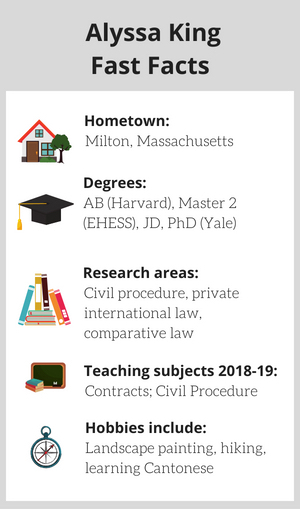
This Q&A is part of a series featuring faculty members joining Queen’s Law this summer. 2018 is a banner year for faculty hires, with the addition of seven new professors to the school’s roster of exceptional scholars. All of these new talented researchers have already earned international recognition in their fields.
Upon arriving in Kingston, Professor Alyssa King spoke with Queen’s Law Reports to share her professional and personal interests.
Why did you decide to join Queen’s Law?
Queen's has a wonderful community. My colleagues seem to be genuinely excited about their research and their students! People here are quick to offer help and collaboration.
What got you interested in your area of law?
As an undergraduate I had the opportunity to take a course from the eminent legal historian, Morton Horwitz. I became interested in the various theories put forward to explain judicial power in the United States. Later, I became particularly interested in how similar debates were happening in other parts of the world and in the role that procedure plays in legitimating adjudicators in the eyes of the parties and the public.

Tell us about your research.
I am finishing up a series of papers that have to do with arbitration in the United States and Europe. In the United States, the federal Supreme Court has clashed with state courts and legislatures over federal protection for arbitration in domestic cases involving consumers and employees. In Europe, the debate concerns arbitrators’ power to hear cases between investors and states within the European Union (so-called intra-EU bilateral investment treaties). In both situations, the introduction of arbitration can alter the balance of power between central and local authorities. In the United States, some state legislatures have sought to make arbitration more like court, which would address some fairness concerns but also risk asking too much of the format. Under U.S. law, arbitrators cannot act like common law judges, creating precedent or making judgments of public policy. In Europe, matters have come to a head with the Court of Justice for the European Union (CJEU)’s Achmea decision, which rejected the idea that investor-state arbitral tribunals can act like courts of the member states and refer EU law questions to the CJEU and also rejected the idea that they could independently interpret EU law. The question then is how far the CJEU’s analysis goes. If EU countries will continue to use arbitration in a variety of settings, and I expect they will, how will the EU's legal system accommodate it?
What are you most proud of?
Several years ago, I had the opportunity to teach at Peking University School of Transnational Law in Shenzhen, PRC. I am extremely proud of the progress that my first-year students made in understanding the common law system and how to work between legal systems. Several of them went on to study abroad and are now working in places like Hong Kong.
Any hobbies or interests?
In my spare time (ha!) I enjoy landscape painting and hiking. I'm also working on my Cantonese.